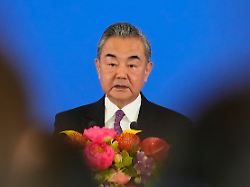Wang’s visit to Washington
China’s foreign minister wants “stable development” with the USA
October 27, 2023, 4:15 a.m
Listen to article
This audio version was artificially generated. More info | Send feedback
From trade to human rights to dealings with Taiwan, there are many sources of conflict that are causing relations between Beijing and Washington to be strained. However, Chinese Foreign Minister Wang Yi and his US counterpart Blinken emphasized a willingness to engage in dialogue at their meeting.
Chinese Foreign Minister Wang Yi expressed hope in Washington for “more stable relations with the US after months of turbulence.” “We want to expand cooperation for the benefit of both sides to stabilize US-China relations and return them to the path of healthy, stable and sustainable development,” Wang said at the start of his three-day visit to the US capital on Thursday (local time) before a meeting with US Secretary of State Antony Blinken. “Therefore, China and the United States must have a dialogue. Not only should we resume the dialogue, it should also be deep and comprehensive,” Wang said.
There will always be disagreements, Wang admitted. China then wants to “react calmly,” he assured. Blinken, for his part, said that he was looking forward to “constructive discussions” with his guest and that a dinner together was also planned.
On Friday, Wang will speak with National Security Adviser Jake Sullivan at the White House. A meeting with US President Joe Biden has not yet been announced, but is expected after Chinese President Xi Jinping also received Blinken in Beijing.
Wang is the highest-ranking Chinese politician in Washington for nearly five years. The visit could also serve to prepare Chinese President Xi’s trip to the United States. This could take place in mid-November on the occasion of the next summit of the Asia-Pacific Economic Cooperation (APEC) in San Francisco, to which Biden has invited Xi. The U.S. government’s top priority is to prevent intense competition between the world’s two largest economies and disagreements on a range of issues – including trade, Taiwan and the South China Sea – from escalating into conflict.
